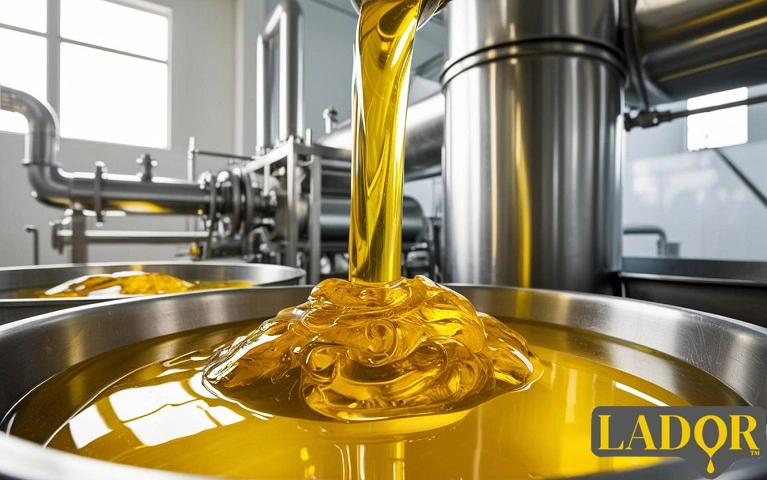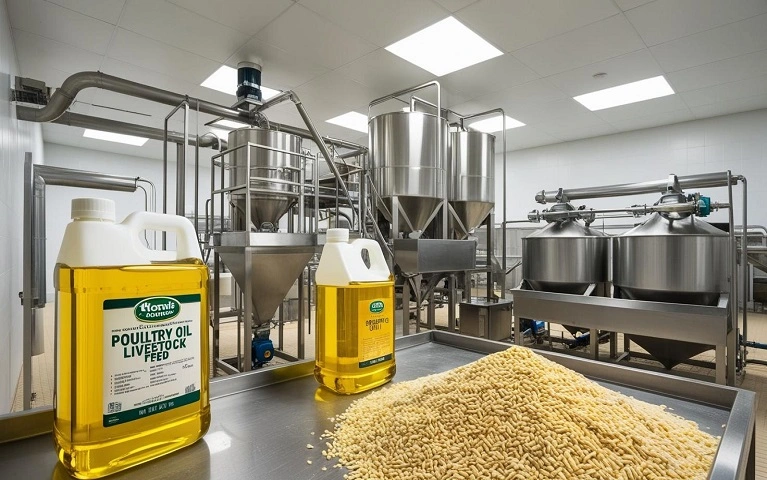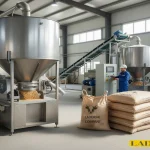Animal soybean oil is one of the most important vegetable oils, widely used in the livestock feed industry due to its nutritional properties and affordable price. Extracted from soybean seeds, this oil contains significant amounts of essential fatty acids, vitamins, and minerals that are crucial for the growth and health of animals. This article will explore the characteristics, benefits, applications, and impact of soybean oil on livestock health.
Applications of Soybean Oil in Various Industries
- Livestock and Poultry: Soybean oil is used to feed livestock and poultry and has many benefits for animals.
- Food Industry: Due to its high smoke point, soybean oil is very suitable for cooking at high temperatures, such as frying. It is also used as a salad oil and in the production of margarine and other plant-based dairy products.
- Cosmetics and Personal Care: Soybean oil, due to its emollient and moisturizing properties, is used in the production of various creams, lotions, and shampoos.
- Pharmaceutical Industry: Soybean oil is used in the production of some drugs and dietary supplements.
- Paint and Resin Industries: Soybean oil is used as a solvent and drying agent in the production of paints and resins.
- Biodiesel Industry: Soybean oil is one of the main sources of biodiesel production.
Characteristics of Soybean Oil in Animal Feed
Soybean oil possesses unique characteristics that make it an ideal dietary source for livestock and poultry. Some of the most important features of this oil include:
Fatty Acid Composition
Soybean oil contains high levels of polyunsaturated fatty acids (PUFAs) such as linoleic acid and linolenic acid. These fatty acids are essential for cell growth and development, immune system strengthening, and improving reproductive performance in animals.
Vitamins and Minerals
Soybean oil contains vitamins E and K, which act as antioxidants and protect cells from damage. Additionally, this oil contains small amounts of minerals such as phosphorus and magnesium, which are essential for bone and muscle health.
High Digestibility
Due to its simple chemical structure, soybean oil is highly digestible and is easily absorbed by the animal’s digestive system.
Affordable Price
Compared to other vegetable oils, soybean oil is more affordable and is therefore widely used in the livestock and poultry feed industry.
Benefits of Using Soybean Oil
The use of soybean oil in the diets of livestock and poultry has numerous advantages, including:
- Soybean oil, with its high energy content and good digestibility, increases weight gain and improves feed conversion ratio in livestock and poultry.
- The use of soybean oil in the diet improves carcass quality and increases the amount of fat in muscle tissues, leading to better meat, flavor, and texture.
- The polyunsaturated fatty acids in soybean oil strengthen the animal’s immune system and increase its resistance to diseases, heat, and cold.
- Soybean oil helps increase feed efficiency in poultry, meaning that less feed can be consumed to achieve greater weight and production.
- Soybean oil improves sperm and egg quality, leading to increased fertility and reproduction in livestock and poultry.
- Soybean oil acts as a dust suppressant, reducing dust in feed. This, in turn, prevents respiratory problems in livestock and poultry.

Chemical composition of soybean oil
Soybean oil contains a wide range of fatty acids, the most important of which include:
- Linoleic acid: An omega-6 fatty acid that plays a crucial role in cell growth and repair.
- Oleic acid: A monounsaturated fatty acid that is beneficial for heart health.
- Linolenic acid: An omega-3 fatty acid that helps reduce inflammation and improve brain function.
Soybean Oil Production Process
Soybean oil is one of the most widely used vegetable oils, extracted from soybeans. The production process of soybean oil involves several stages, which are briefly described below:
Cleaning and Preparation of Beans
- Cleaning: Soybeans are cleaned of impurities such as dirt, stones, and other foreign materials.
- Drying: The beans are dried to reduce their moisture content, making oil extraction easier.
Crushing of Beans
- Soybeans are crushed into smaller pieces to increase their surface area in contact with the solvent or press, facilitating oil extraction.
Oil Extraction
- Cold Pressing: In this method, soybeans are subjected to very high pressure, and the oil is mechanically extracted from them. This method produces higher-quality oil with a better flavor but has a lower yield.
- Solvent Extraction: In this method, a chemical solvent such as hexane is used to extract the oil. The crushed beans are mixed with the solvent, and the solvent absorbs the oil present in the beans. Then, this mixture is separated by distillation, leaving behind the pure oil. This method has a higher yield but may destroy some of the oil’s nutrients.
Oil Refining
- Degumming: Gummy substances present in the oil that cause turbidity are removed.
- Neutralization: Free fatty acids present in the oil are neutralized.
- Bleaching: Natural pigments in the oil are removed to lighten its color.
- Deodorization: Unpleasant odors of the oil are removed.
- Hydrogenation (if necessary): This process is carried out to solidify the oil and increase its shelf life.
Packaging
- The refined oil is packaged in various containers and is ready for consumption.
Negative Effects of soybean oil
- Low-quality soybean oil, oxidized or containing impurities, can have more negative effects on poultry health.
- Excessive consumption of soybean oil in the diet, even if it is of high quality, can be harmful.
- Young chicks and some poultry breeds may be more sensitive to soybean oil.
Prevention and Reduction of Negative Effects
-
- Use of high-quality soybean oil: Choosing refined and oxidation-stable soybean oil is very important.
- Controlling consumption: The amount of soybean oil in the diet should be adjusted based on the nutritional needs of poultry and the recommendations of nutritionists.
- Use of antioxidants: Adding natural or synthetic antioxidants to the diet can prevent the destruction of fat-soluble vitamins.
- Dietary diversity: Using other fat sources such as corn oil, sunflower oil, or animal fat can help reduce the adverse effects of soybean oil.
Ethical Concerns animal soybean oil
The production of animal soybean oil raises significant ethical concerns:
- One of the primary concerns is the welfare of the animals involved. Genetically modifying animals can lead to unintended health problems or suffering.
- There are also concerns about the potential for genetically modified animals to escape into the environment and breed with wild populations, leading to unforeseen ecological consequences.
- Another ethical concern is the potential for animal soybean oil to contribute to the exploitation of animals for human benefit. Critics argue that the production of animal soybean oil reinforces the idea that animals are merely commodities to be exploited for human gain. They contend that it is morally wrong to genetically engineer animal food products.

Advantages of Soybean Oil Compared to Other Supplements in Livestock and Poultry Nutrition
Soybean oil, as one of the main dietary supplements in livestock and poultry nutrition, has several advantages compared to other supplements. These advantages have made soybean oil a popular choice in the livestock and poultry industry.
- Soybean oil contains significant amounts of essential fatty acids such as linoleic acid (omega-6), which are essential for growth, skin and feather health in poultry, improved reproductive performance, and strengthening the animals’ immune system.
- Due to its high-calorie content, soybean oil provides the energy needed by animals increases weight gain, and improves reproductive performance.
- Soybean oil is easily digested by the animal’s digestive system, and its nutrients are well absorbed by the body.
- The use of soybean oil in the diet of livestock and poultry improves meat quality, increases egg size, and improves egg yolk color.
- Compared to other vegetable oils, the price of soybean oil is more affordable.
- Soybean oil is easily available on the market.
- In dairy cows, soybean oil increases milk production, improves milk quality, and increases milk fat.
- Soybean oil helps improve the physical condition of livestock and poultry, including skin, feathers, and hair.
Ala Sepahan Oil Factory
Ala Sepahan Oil Factory, with Lador brand is equipped with the latest oil extraction and refining machines and is under the supervision of experienced engineers in the field of producing poultry oil, industrial oil and various types of fat powder.
This company also has something to say in the production of raw materials and additives for livestock and poultry feed, such as ready-made animal feed and low prices and at the same time high-quality animal feed, in small packages and bulk animal feed, dairy and fattening animal and poultry feed.
Conclusion
Soybean oil, as a valuable nutritional source, plays an important role in livestock and poultry nutrition. This oil contains high amounts of essential fatty acids, vitamins, and minerals that are necessary for the growth and health of animals. The use of soybean oil in livestock and poultry diets increases weight, improves carcass quality, strengthens the immune system, and increases reproduction. When it comes to getting the best soybean oil, choosing a reputable supplier is very important. Contact ladorfat experts for price inquiries and advice.



